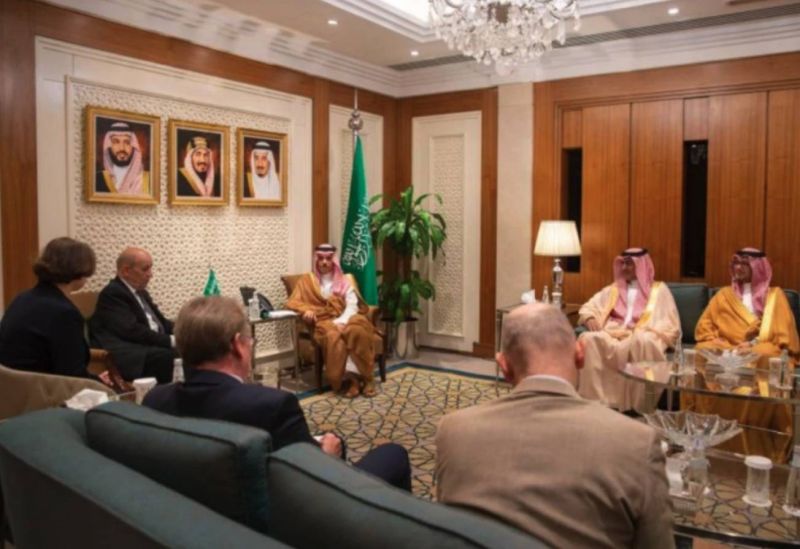
Fance's special envoy for Lebanon, Jean-Yves Le Drian and Saudi Foreign Minister Faisal ben Farhan, during their meeting in Riyadh, September 27, 2023. (Credit: Saudi Ministry of Foreign Affairs via X)
France’s special envoy for Lebanon, Jean-Yves Le Drian, has been tasked with the mission of bringing Lebanon’s presidential vacuum, which has persisted for 11 months and counting, to an end.
Le Drian has turned up the heat, warning Lebanon’s political actors that they are at risk of becoming subject to international sanctions, which could block aid needed to end the crisis.
Le Drian traveled to Riyadh on Wednesday for talks with the Saudi Minister of Foreign Affairs, Faisal bin Farhan, in the presence of the Royal Court advisor for Lebanon, Nizar Al- Aoula and Saudi ambassador to Beirut, Waleed Bukhari.
‘Dialogue is a waste of time’
The meeting showcased that Le Drian was in harmony with the rest of the quintet, easing rumors of disagreement between France and the remaining Group of Five partners (the United States, Saudi Arabia, Qatar and Egypt), which have circulated since their last meeting in New York.
“It was the French diplomat who proposed holding this meeting in order to anchor his action in the position of the [group of] five,” a diplomatic source who requested anonymity told L’Orient-Le Jour. “It is in France’s interest to coordinate with its partners in the quintet, particularly since Qatar is in the process of leading an initiative that could be successful at Paris’ expense,” the diplomat added.
During the talks, the Saudis reminded Le Drian that they were committed to the position expressed by the Group on Feb.6 at the first meeting in Paris, during which they for the election of a president that would not represent a challenge to either side. Since then, the others rejected France’s proposition (since abandoned) that the presidency be granted to Hezbollah’s candidate Sleiman Frangieh in turn for a prime minister of the opposing camp’s choosing.
In response, Le Drian reiterated to his Saudi hosts what he said in an interview with L’Orient-Le Jour earlier this week: the time had come to look for a third option and to go beyond Jihad Azour and Sleiman Frangieh.
Bin Farhan is also said to have insisted on the need to put an end to the presidential vacuum as soon as possible. “The priority is to hold an open session leading to the election of a president. Dialogue is a waste of time,” the aforementioned diplomat quoted him as having said. This is while Parliament Speaker Nabih Berri made the convening of an electoral session conditional on holding a week-long national dialogue initiative. Moving forward, Le Drian proposes replacing dialogue with a series of consultations between the various Lebanese players, which could take the form of bilateral or trilateral meetings — a suggestion endorsed by Riyadh.
The French envoy is expected to return to Beirut to conduct these meetings and urge Berri to convene an open electoral session. L’Orient-Le Jour was also informed that Saudi Arabia called on the French envoy to convince Amal and Hezbollah to drop Frangieh’s candidacy, notably by raising the specter of sanctions.
In search of a consensus candidate
Meanwhile, Doha is also moving its pawns. Last weekend, Qatar’s envoy Abu Fahd Jassem al-Thani visited Lebanon with a list of names that could potentially serve as compromise candidates. Thani met Hezbollah leaders and presented them with three options. The first, Lebanese Army Commander Joseph Aoun, seen as the favorite of Doha and the international community in general.
“The Shiite party insisted that its candidate remains Sleiman Frangieh,” and stressed that “General Aoun’s accession to Baabda is not a foregone conclusion as long as he continues to be vetoed by his two allies: Gebran Bassil and Nabih Berri,” said a diplomatic source.
The Qataris then mentioned MP Neemat Frem (independent, Kesrouan), who Hezbollah perceived as being affiliated with the opposition camp. The party cited that Frem, a businessman, has economic interests in the United States and Gulf countries. Finally, the name of the acting director of General Security, Elias Baissari, with his balanced relations with all the political players, was also put forward.
Simultaneously some players felt that former Finance Minister Azour should not be put in the same category as Frangieh, especially since his candidacy was the result of convergence between the opposition and the FPM and that he possessed the qualifications desired by the international community. It is therefore possible that his name will once again be put on the table by the Group of Five.
“During his negotiations with Hezbollah, Gebran Bassil mentions the Jihad Azour option and is trying to obtain an agreement on his candidacy,” said a source close to Amal and Hezbollah.
The search for a consensus candidate remains preliminary, pending the arrival of Le Drian for a fourth time. If he fails to convince the different political players, particularly Amal and Hezbollah, to break the deadlock, Qatar will move up a gear. Doha could send its Minister of State for Foreign Affairs Mohammed bin Abdulaziz Al-Khulaifi to Beirut to employ his good relations with all the players. On Thursday, the Qatari ambassador to Beirut, Mohammed bin Abdulrahman Al Thani, visited Maarab, where he discussed the presidential dossier with Lebanese Forces leader Samir Geagea. Qatar claims to have the green light from Riyadh and Washington and maintains cordial relations with Iran.
This article was originally published in French in L'Orient-Le Jour. Translation by Joelle El Khoury.